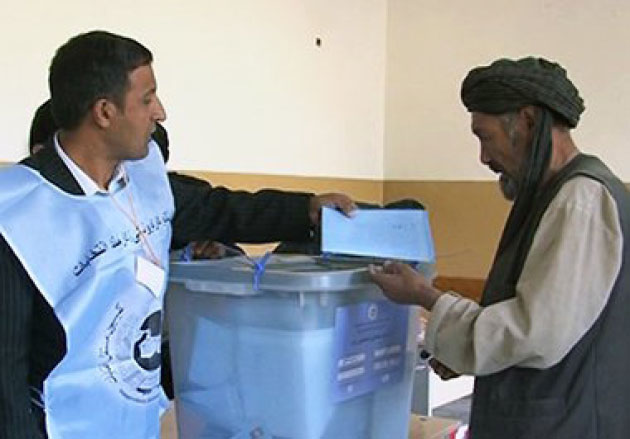In few last days, Kabul has been witnessing new waves of criticisms and concerns over low participation of people in voter registration ahead of parliamentary and district council elections scheduled to be held in the current year. On Saturday, the Wolesi Jirga summoned Hamayon Muhtat, the head of Population Registration Department (PRD) and acting Independent Election Commission (IEC) secretary Shahla Haqparast to brief lawmakers about preparations for the upcoming elections, ID cards distribution, voter registration and sticker attachment. Some of lawmakers expressed concerns over slow voter registration and ID cards distribution processes but others such as Fatima Nazari, criticized that there is only one center in the entire west of Kabul for ID card distribution implying as a kind of delay tactic applied on certain part this society to deprive them from voting process. The next day, the same solitary and overcrowded center was attacked and left nearly a hundred causalities including injuries and death.
Other MPs such as Humayon Humayon, Haji Zahir Qadir and Mirwais Yaseni claimed that the voter registration forms were sold and purchased. Humayon, first deputy speaker, said those wishing to contest the Oct 20 to polls might misuse the forms. However, Shahla Haqparast said: “No evidence is available to prove voter registration forms or stickers to be sold, the voter documents have special numbers and no one can misuse them.” Generally, the lack of voter awareness, insecurity and consequences of stickers on ID cards, lack of enough ID card distribution center in certain area, lack of ID card, lack of people’s interest and distrusts on the election process have been mentioned as factors for the slow voter registration.
During the summon, it was reported to the wolesi Jirga that 160,000 paper identity cards were distributed to people within a month time (March 21 to April 20) while 189,000 registered as voters in one week across the country. IEC officials told the lower house that the attachment of a sticker to the paper ID cards of those registering as voters was being reconsidered. Humayun Muhtat, PRD head, added that full transparency in the electoral process should not be expected in the absence of a biometric system. He said his department was ready to distribute ID cards to 10 million people eligible for vote in coordination with the IEC. According to Muhtat, 30 million people had received ID cards over the last 45 years. The ID cards distribution process is underway and so far 235,000 people have obtained the paper cards during the past three months across the country. He said 153,000 officers had been given the responsibility distribute the ID cards across the country. Ten million people would be issued the cards over the next six months.
Meanwhile, the Ministerial Council held an extraordinary meeting on Saturday to bargain over the poor appearance of people in voters’ registration process. The Chief Executive Abdullah Abdullah voiced serious concern over the voters’ registration process and discussed with government officials to find a solution. Abdullah noted that people who go to a registration center, they must have their identity cards with them and only the people who register will be able to vote in the forthcoming elections. He also warned that if the voters’ registration process faces failure, the political situation in the country would be challenging.
The Chief Executive also called on religious scholars, tribal elders, monitoring institutions and government officials to make further efforts on the widespread participation of people in voters’ registration process. While a day before, President Ghani had also called on religious scholars, civil society, women’s networks and all to work for creating awareness among the people. The voter registration process was launched last Saturday by President Ghani and the first lady Rula Ghani. According to officials, the first phase starting on 14th April at provincial capitals will continue up to 13th May; Second phase will start on 15th to 28th May in the center of the provincial districts; and Third phase will start on 30th May to continue up to 12th June 2018 in villages. Holding an ID card and age of 18 are the only requirements to register for elections.
Thus, Election and Transparency Watch Organization of Afghanistan (ETWA) warned on Saturday that the voter registration for the forthcoming parliament and district council elections was moving quite slowly as the public turnout was all time low. The watchdog in a statement said that the insurgents constantly attacked voter registration centers in Ghor and Badghis. The organization believed that improper logistic and security arrangements of the government and its election body have been the reason behind a lagging voter registration.
The watchdog recommended awareness programs be planned, political parties and civil societies be encouraged to support the campaign, public trust be gained, facilities for voter registration be bolstered, religious and tribal elders be inspired to foster public participation in the registration process. The voter registration process will be carried out in three phases;
Overall lack of presence of people is a serious issue that may harm the legitimacy of election. if there is no collective action taken by government, IEC, political parties, media and civil society to overcome issue, the election may change to another crisis in the country. However, the IEC reluctantly admitted that they may extend the voter registration period if it continues to be unsatisfactory. “If people’s participation were proved less, then other alternative options could be to extend the voter registration in the cities,” said Maliha Hassan, a commissioner of the IEC.
Home » Opinion » New Waves of Criticism over slow voter registration
New Waves of Criticism over slow voter registration
| Mohammad Zahir Akbari

